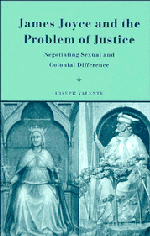Book contents
- Frontmatter
- Contents
- Preface
- Acknowledgments
- List of abbreviations
- 1 Justice unbound
- 2 Joyce's sexual differend: an example from Dubliners
- 3 Dread desire: imperialist abjection in Giacomo Joyce
- 4 Between/beyond men: male feminism and homosociality in Exiles
- 5 Joyce's siren song: “Becoming-woman” in Ulysses
- Epilogue: trial and mock trial in Joyce
- Notes
- Index
3 - Dread desire: imperialist abjection in Giacomo Joyce
Published online by Cambridge University Press: 08 January 2010
- Frontmatter
- Contents
- Preface
- Acknowledgments
- List of abbreviations
- 1 Justice unbound
- 2 Joyce's sexual differend: an example from Dubliners
- 3 Dread desire: imperialist abjection in Giacomo Joyce
- 4 Between/beyond men: male feminism and homosociality in Exiles
- 5 Joyce's siren song: “Becoming-woman” in Ulysses
- Epilogue: trial and mock trial in Joyce
- Notes
- Index
Summary
Unpublished in the author's lifetime, Giacomo Joyce was probably unintended for publication at any time, not only because it is so fragmentary, a mere sketchbook of the artist, or because it is so intimate, a lover's diary wherein Joyce confesses in a less than foreign language, but because it is so ideologically uncensored, constituting, as Vicki Mahaffey has amply demonstrated, a gallery of invidious portraitures (of women, Jews, Near Eastern peoples, Italians, etc.) which Joyce would dramatically revise and rework in his later writing, thanks in large part to the ethico-political understanding he achieved in living this interlude and composing this artifact. The one provision Joyce did make for the audience of history was to go back to this self-indulgent production and enclose, by way of the wry title and a single, profoundly leavening interpolation, the beginnings of a critical reassessment. The technical innovations that Joyce introduced as a function of this effort simultaneously define Giacomo Joyce as a transitional stage in his development as an artist and a somewhat tortured reaction to a moment of political as well as emotional delirium, an attempt to expose and situate his dalliance with some of the deadliest impulses of modern European culture. Thus, the often facile equation between the formal/stylistic experimentation of (post-) Modernist writing and its presumed political engagement or radicalism - epitomized in the phrase “the Revolution of the Word” - is to a degree borne out in Joyce's case by the creative history of this largely overlooked interstitial document.
- Type
- Chapter
- Information
- James Joyce and the Problem of JusticeNegotiating Sexual and Colonial Difference, pp. 67 - 131Publisher: Cambridge University PressPrint publication year: 1995



